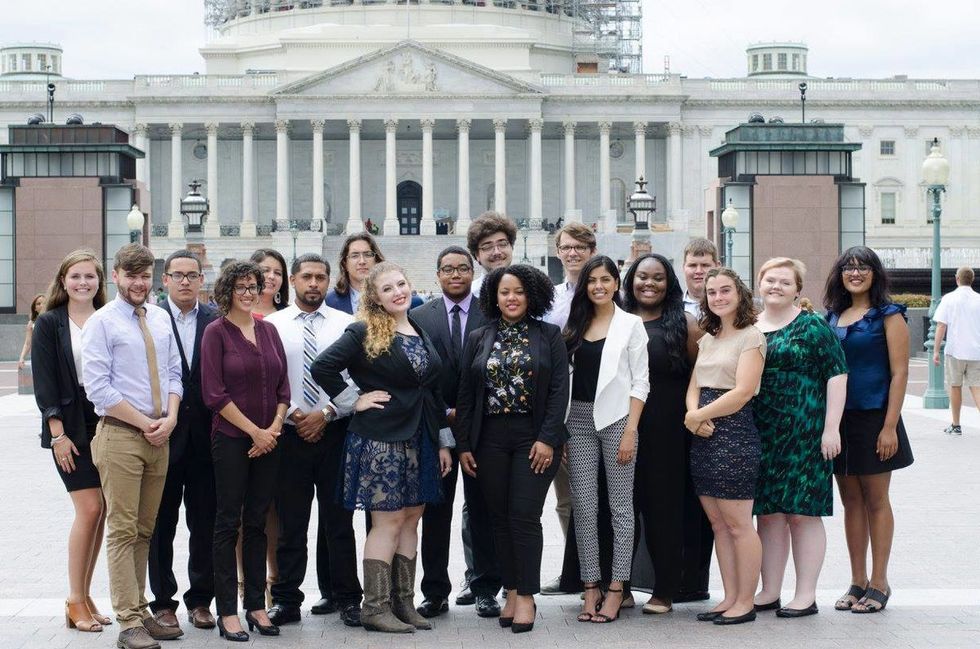I still remember filling out the application last March, wondering if my efforts were all in vain. Was this meant for me? Am I meant for this? A mixture of fear, apprehension and anticipation came over me as I clicked “Submit My Application” and waited for my interview call. At the time, I was sure of two things: 1) that I had no confidence in myself and my abilities and 2) that, if accepted, this program would change my life.
I’ve been asked a lot by friends, family and co-workers about what exactly I’ve done for the Friends Committee on National Legislation, a DC-based Quaker lobby in the public interest. The truth is, the answer is anything but simple - because it’s not just what I’ve done for them, but also what they’ve done for me. The short answer includes the general headlines about how I’ve been a community organizer this past year, bringing local constituents to congressional offices and communicating stories to push for compassionate immigration reform. A mouthful, right?
But, like I said, there’s so much more to this experience.
When the time came for my Skype interview for the Advocacy Corps, the interview that would likely determine my entrance into the program, I was a bundle of nerves. How was I going to tell my interviewers, people who were soon to be my mentors, coordinators and friends, that I had limited experience with political advocacy? That I really didn’t know how to lobby? And above all, that I did not know much about immigration aside from my own family’s immigration story?
As it turns out, my story was all I needed.
So I was honest - when I was asked how I planned to communicate with members of Congress, I said I would use my story as a reminder of our shared humanity and a reminder that while they occupied elevated political positions, stories could still move them like they’ve moved me. The day I received the call that I had been accepted into the program, I learned that this was exactly the mission the Friends Committee was trying to fulfill.
After spending 10 life-changing days in Washington, D.C. with the other newly initiated organizers, I came home to Portland with a realization that has since become the root of all my advocacy work: our stories make a difference. My skeptical friends tell me that stories aren’t what politicians care about, that cliche statements like ‘making a difference’ are meant for irrational optimists. To those skeptics, all I have to say is this: you’ve probably never seen the softened expression of a congressional staffer who has just heard about the fear a DACA recipient is experiencing in the current political climate. You’ve probably never seen the eyes of a bored staffer suddenly spark with interest when they realize we’re not there to talk about Trump, Russia, or Comey - but rather, to talk about our unique experiences, our identities and our passion for advocacy. We were there to ask our leaders to reach across the aisle in a time when political stances are more polarized than ever. Even in the face of adversity, we pushed on and continued asking Senator Wyden and Senator Merkley to cosponsor the BRIDGE Act in an effort to protect the immigrant communities that are so integral to our nation.
Learning the art of advocacy through storytelling has brought me closer to so many people I wouldn’t have normally connected with. Stories reveal a deeply intimate part of a person’s life and through the Advocacy Corps, I’ve had the rare opportunity to see these sides of my community. To say that only nine months of organizing has built these stronger and broader networks in my life speaks to the incredible power of community organizing in both my personal and professional life.
As I write this, my time as an Advocacy Corps member is coming to end and yet, I feel like my journey is only beginning. I often ask myself how I happened to be working on immigration in the year when it feels like we need immigration advocates the most. I cannot say whether it was Providence or serendipitous chance - but I know that who I am in this moment is who I have always wanted to be. Who I am now is a woman entering the male-dominated realm of politics. Who I am now is an individual who does not shy away from conflict, but rather, admires and embraces it wholeheartedly. Who I am now is a person who has the courage to live by her convictions. And now, almost a year later, I’m still sure of two things: 1) that with the support of my loving FCNL family and the incredible influence of local communities, I have a renewed confidence in myself and 2) that through strong friendships and powerful stories, the Advocacy Corps has truly changed my life.



















